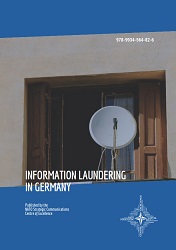Information Laundering in Germany
Information Laundering in Germany
Author(s): Belén Carrasco Rodríguez
Contributor(s): Philip Birzulis (Editor)
Subject(s): Politics / Political Sciences, Politics, Social Sciences, Media studies, Political Theory, Communication studies, Sociology, International relations/trade, Politics and communication, Theory of Communication, Crowd Psychology: Mass phenomena and political interactions
Published by: NATO Strategic Communications Centre of Excellence
Keywords: Information laundering; Germany; information influence campaign; transnational networks; Kremlin’s influence; media;
Summary/Abstract: Information laundering (IL) is a stratagem used by hostile actors within an information influence campaign. In this process, false or deceitful information is legitimised through a network of intermediaries that gradually apply a set of techniques to distort it and obscure the original source. In the context of this research, IL is leveraged by Kremlin-official or pro-Kremlin actors in a hostile information influence campaign (HIIC) to further their interests in Germany. Information Laundering represents a relatively new approach to information influence activities targeting a particular media environment. In the context of this report, IL research allows governments, national institutions and civil society to reach a deeper understanding of the activity of domestic and transnational networks that enable the spread of the Kremlin’s influence in a particular country, since it uncovers how actors gradually distort, disseminate, and legitimise a piece of information through the application of IL techniques.
- Print-ISBN-13: 978-9934-564-82-6
- Page Count: 47
- Publication Year: 2020
- Language: English
- eBook-PDF
- Table of Content
- Introduction

